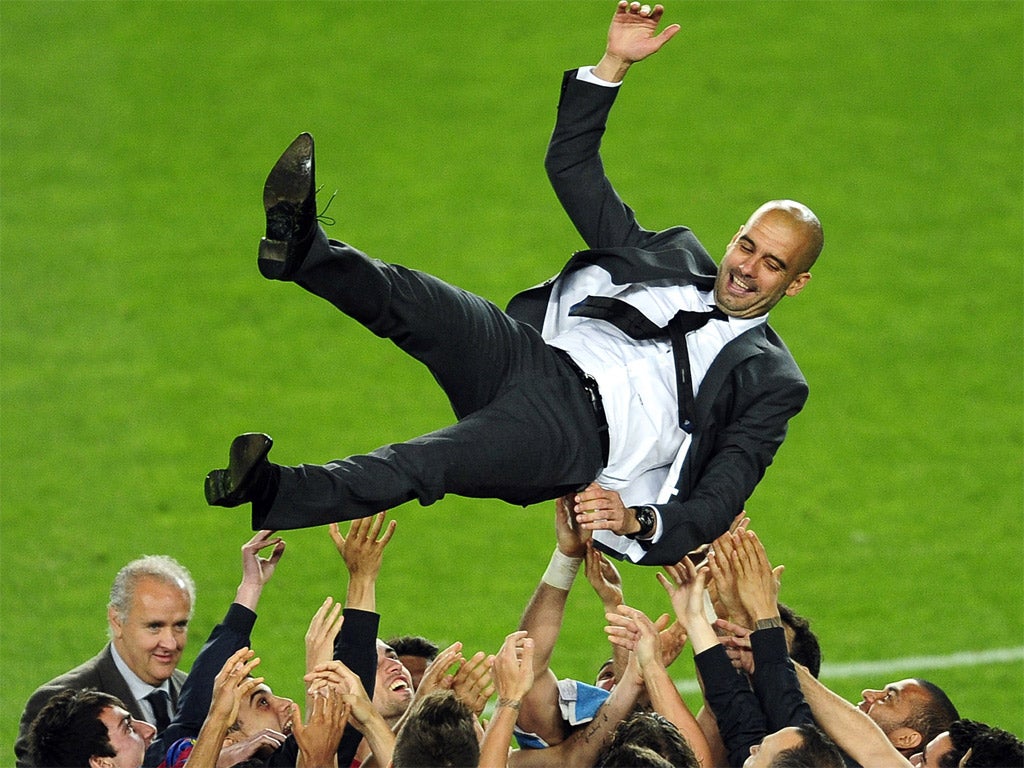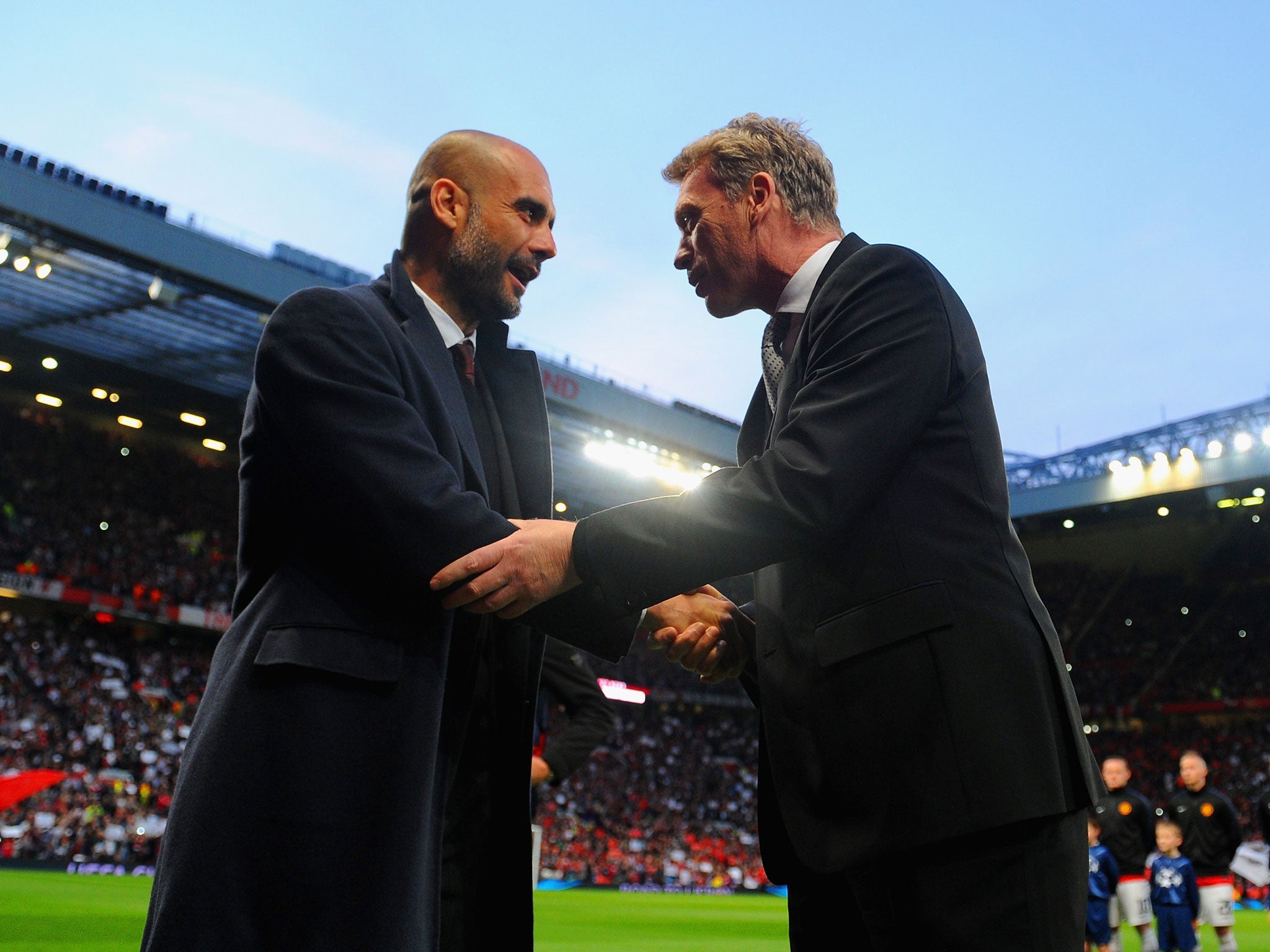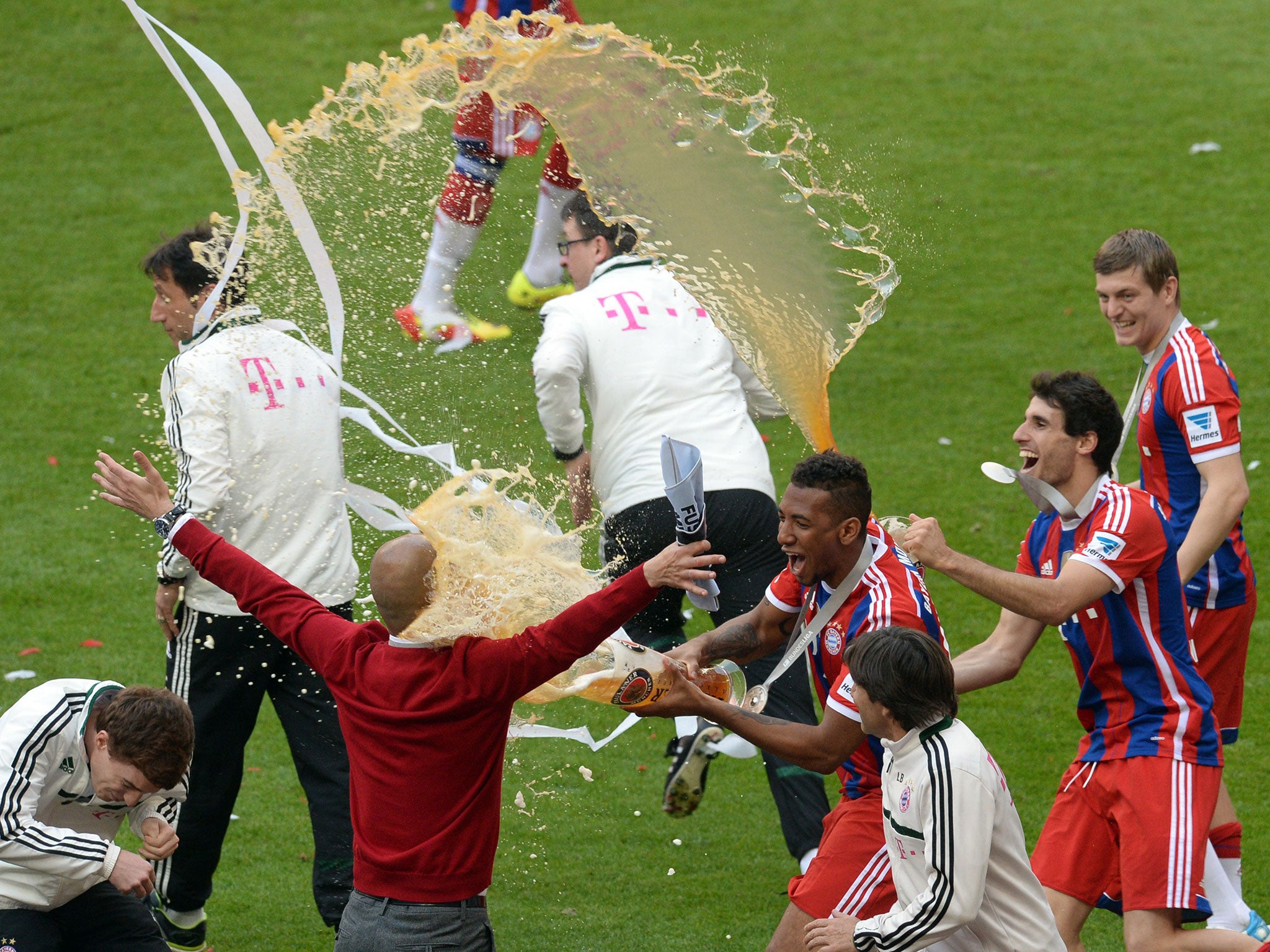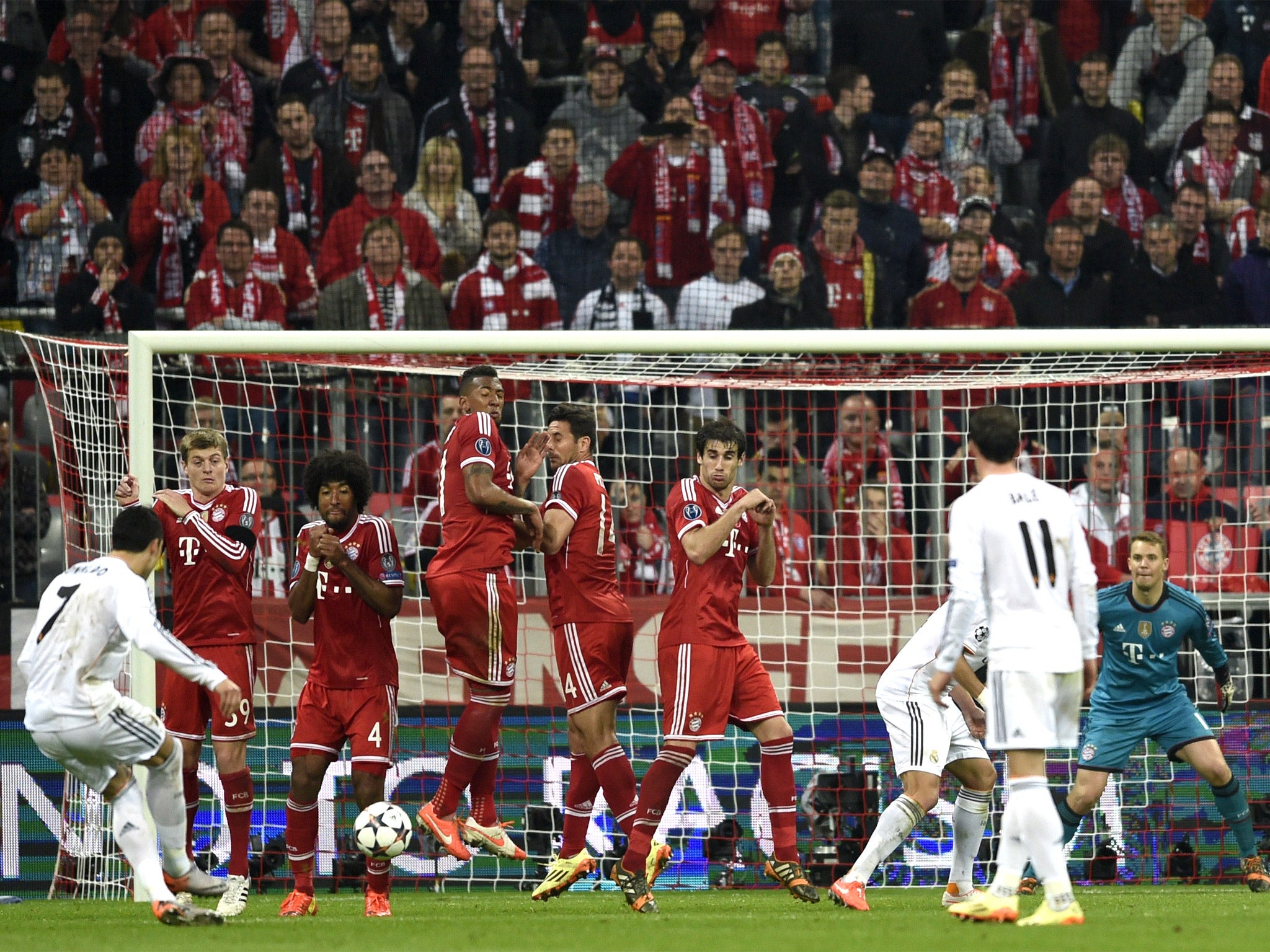During Pep Guardiola’s football sabbatical in New York – as well as becoming friends with former world chess champion Garry Kasparov – he was told by his friend the film director David Trueba what a pity it was that his four years at Barcelona, creating probably the finest team to have ever played, had not been recorded on film.
Such an eventuality would surely have been impossible, but in Pep Confidential, football has almost the next best thing. Marti Perarnau, a sports journalist and former athlete, spent the entirety of Guardiola’s first season at Bayern Munich with complete access, as they won the league within a record 27 matches, but were humiliated by Real Madrid in the Champions League semi-final, after which Guardiola said he got the tactics “totally wrong”.
It is often asked, “Just how good is Pep?” Is he truly football’s newest, greatest genius, or was he merely fortunate to be in charge of a golden generation of players at Barcelona? In this book, Peranau makes the answer obvious, and it is not the latter. Here are some key extracts:
ON LEAVING BARCELONA
Despite the team’s continuing success, Pep knew that his time at Barça was nearing its end. “The day I see the light go out of my players’ eyes, I’ll know it’s time to go.”

By early 2012, some eyes were already a little less bright. People around Barcelona have often claimed that Guardiola’s decision to leave was influenced by Sandro Rosell’s lack of support for his plans to make drastic changes to the squad. These plans apparently included selling players such as Gerard Pique, Cesc Fabregas and Dani Alves.
The Catalan coach flatly denied this when we spoke: “It’s just not true. I left Barcelona because I was worn out. I explained how I felt to the president in October 2011. There was no change of heart after that. So it would have made no sense at all for me to start changing the squad. I knew I was leaving! The facts of the matter are that we won four titles that year and were playing better than ever, with the 3-4-3 we used against Real Madrid and the 3-7-0 I opted for in the Club World Cup.
“We were playing brilliantly but I was on my knees and had no new tactical ideas left. That was why I left. There was no other reason.”
ON CHESS
Guardiola’s eternal doubts are not part of his character, nor a sign of a lack of decisiveness or nerve. No, his doubts come from his determination to calibrate all the possibilities. My thoughts automatically turned to the chess player who analyses all the possible variables before making his move and I decided to share this with him.
“The process of picking a line-up is a bit like sitting in front of your chess pieces. You’ve no idea how similar the two things are,” said Guardiola.
“You didn’t read the interview Leontxo García did with Magnus Carlsen [the world chess champion] in El Pais by any chance? There was one thing Carlsen said that I loved. He said that it doesn’t matter if he has to make some sacrifices at the start of the game because he knows that he is at his strongest in the latter stages. It really got me thinking and I must learn how I can apply it to football.”
ON TIKI TAKA
“I loathe all that passing for the sake of it, all that tiki taka. It’s so much rubbish and has no purpose. You have to pass the ball with a clear intention, with the aim of making it into the opposition’s goal. It’s not about passing for the sake of it.”
ON BORUSSIA DORTMUND
“They’re like a steamroller, unstoppable. There are other teams who counter-attack brilliantly, like Madrid for example, but Dortmund are unique. I’ve never seen anything like it. They are completely focused for 90 minutes, waiting for you to mess up a pass so that they can set their sprinters on you. I must take some time to really study this and see if there’s any way to stop them.”
ON MANCHESTER UNITED
“I like this atmosphere. I could see myself coaching here one day.”

ON MAKING MESSI THE FALSE NO 9
May 2009, Guardiola rings Lionel Messi late at night, before El Clasico: “Leo, it’s Pep. I’ve just seen something important. Really important. Why don’t you come over. Now, please.”
At 10.30pm there is a gentle knock at Pep’s office door and a 21-year-old Leo Messi comes in. The coach shows him the video, pausing it to point out the empty space. He wants his player to make that space his own. From now on it will be “the Messi zone”.
“Tomorrow in Madrid I want you to start on the wing as usual, but the minute I give you a sign I want you to move away from the midfielders and into the space I just showed you.”
ON THE MORNING AFTER WINNING THE BUNDESLIGA
The sheer exuberance of his players proved so infectious that for the first time in his coaching life Guardiola decided to get up and dance with them. Just for that night he was one of the lads, having a few drinks and really letting his hair down. Sometime during the night, Franck Ribéry grabbed him around the neck and announced: “I love you Pep. You are in my heart, man. I’m just a street kid but you will always be in my heart. Never in my life did I think I could learn as much as I have this year.”
I was keen to observe the team in their first training session after this triumph. The day after a great victory can be hugely illuminating. Would they be complacent after winning? Would they see this victory as a catalyst for future triumphs or the end of a chapter?
Not once did they slow down or relax and, at one point, Guardiola came over to me to say, delightedly: “Ribéry’s having his best session of the year. The guy’s a beast. An absolute beast.”

With the league in the bag and the Champions League looming on the horizon, it felt like a good time to sit down with Pep.
“Our worst 10 minutes this season were in the Emirates. Manu’s [Neuer] hand saved us that day,” he reflected. “Our best? Probably the game against City in Manchester or the first 40 minutes of the Hertha match in Berlin.”
I mention all the records they have broken. “To hell with breaking records! I just hope we can get our minds off breaking records. It really doesn’t matter from now on if we win or lose, if we concede goals or not. We’re thinking about the Champions League and the DFB-Pokal [the German Cup] now. The league is done as far as we’re concerned.”
AT A DINNER AFTER THE CHAMPIONS LEAGUE SEMI-FINAL FIRST LEG 1-0 LOSS AT THE BERNABEU
“I understand that this style of game is not part of German football culture. People should know that I do understand. In Germany clubs like to play a style of football that’s very different from my own and no doubt people prefer Madrid or Dortmund’s game. But guys, Bayern chose me. I am making compromises between my ideas and German football but at the end of the day it’s the players who matter. And I’ll tell you something: the players support my ideas.”
BEFORE THE SECOND LEG, A 4-0 DEFEAT AGAINST REAL AT HOME
At 3am on Thursday, April 24, Guardiola is considering the obvious fact that Real Madrid will shut up shop when they visit the Allianz Arena for the second leg and that he will be counting on all the same weapons as in the first game.
The coach also has Garry Kasparov’s words ringing in his ears: “Remember, Pep, you don’t win games just because you’ve moved your pieces to the front.”
It is during this early-hours reflection on what he has just seen that Pep decides to play the return leg with a 3-4-3 formation. It’s then that I overhear Guardiola telling [Domenec] Torrent [the assistant coach at Bayern]: ‘Dome, don’t let me change my mind. This is the only way to go.’
Then, on the flight back to Munich, Pep changed his mind. The coach decided to leave the 3-4-3 for next season and by the time the plane touched down in Munich Pep had switched to a 4-2-3-1. By Monday the players are fired up and eagerly anticipating their chance to take revenge on Madrid.
It’s then he makes a big mistake. He asks his men how they are feeling and they talk to him about the German talent for glorious comebacks, as well as the passion they have all felt on similarly epic nights in the Allianz Arena.
Pep changes his mind again. The 3-4-3 had become a 4-2-3-1, but now he opts for a 4-2-4 formation. Just as he did in Dortmund in July 2013, in his debut match. But it didn’t work in Dortmund, and it won’t work now.
AND AFTER
“I got it wrong man. I got it totally wrong. It’s a monumental fuck up. A total mess. The biggest fuck up of my life as a coach. I spend the whole season refusing to use a 4-2-4. The whole season. And I decide to do it tonight, the most important night of the year. A complete fuck up.”

ON NEXT [THIS] SEASON
“We will play better. We won’t be comparing ourselves with Jupp [Heyncke’s] Treble, but with our own achievements this season. It was completely normal and natural that after all that Heynckes had done, everyone wondered why we needed to change. I thought the same thing myself at times.
“We’ll never know how it would have turned out if we hadn’t made those changes but football is evolution and successful change depends on the kind of players you have. I had to use a style I wasn’t committed to many times this season but that adaptation was also to allow the guys to regain match sharpness and tempo. You need to make mistakes if you want to make progress.
“In the last 11 months the team has lived through enormous change and we have had moments of sheer brilliance as well as real setbacks, of which the Champions League was the worst.
“Some of our Champions League matches were outstanding: at the Emirates, Old Trafford and the Bernabeu, for example. And it’s those games, the ones in which we played the kind of football I wanted, that are important. And in time we’ll give the Bayern support a lot more of them, and then one day we’ll realise that the time has come to stop.”
Pep Confidential: The Inside Story of Pep Guardiola’s First Season at Bayern Munich, is out now in paperback and ebook, published By BackPage Press / Arena Sport.”

Join our commenting forum
Join thought-provoking conversations, follow other Independent readers and see their replies
Comments